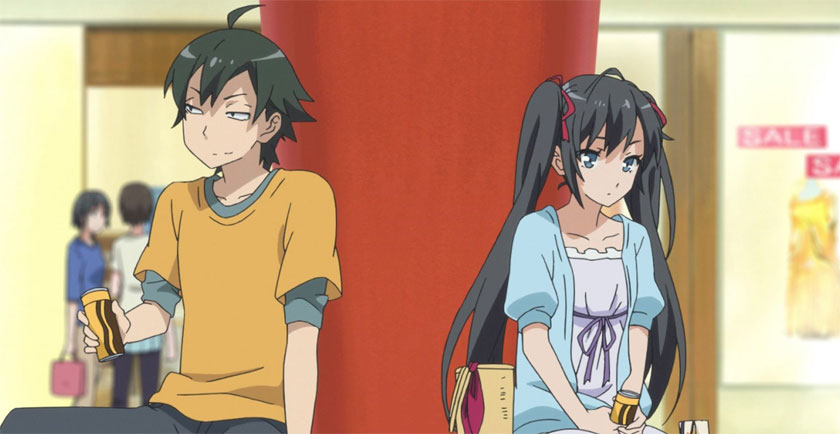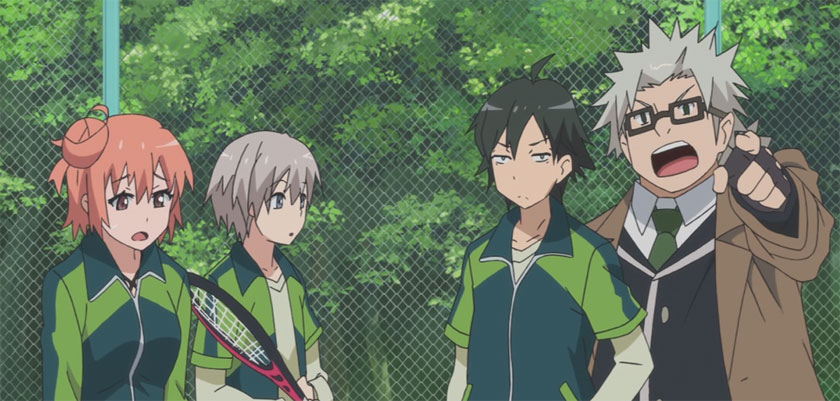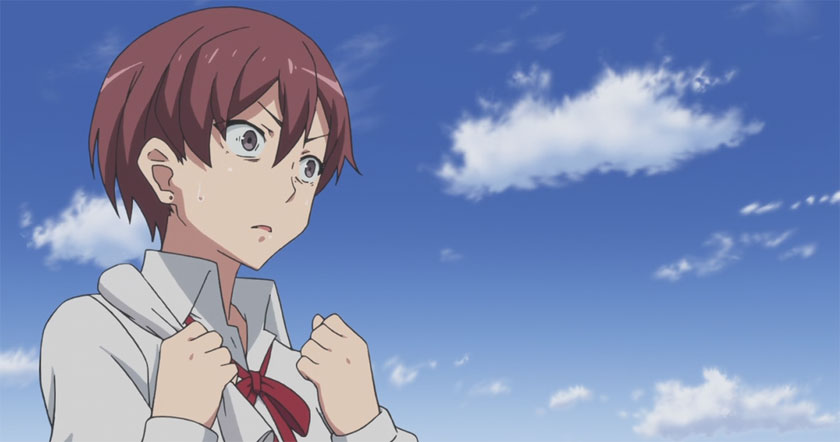I Was On a Podcast For My Teen Romantic Comedy SNAFU!
I was invited onto a podcast to discuss the first season of My Teen Romantic Comedy SNAFU!, a rather unfortunate name for a series far more intelligent than its title would suggest. However, it is properly misleading since even some of the light novels are graced with a degree of cheesecake to lure unsuspecting viewers in. It is an unfortunate double-edged sword, where the audience that would likely find the greatest appeal might be dissuaded to watch due to the title, whereas those looking for something more average will be surprised to discover substance.
Some may recall that I had written about this show once already, just before the final two episodes had first aired. I’ve since watched it a second time, and viewed the first season a third time for the sake of my colleague’s podcast. I’ve learned a lot more about these characters during these viewings; what makes them tick, and what makes them interesting.
Despite a two hour conversation on just the first season, I have notes of character quirks, lines of dialogue, and potential themes that I was not able to thoroughly address during our recording. As such, I hope to address them now: in particular, Hachiman Hikigaya’s and Yukino Yukinoshita’s conflicting perspective on change, and how the former’s attitude gradually begins to shift.
It should be noted that the first season of the anime did a poor job of understanding the source material. Just as I mentioned the first time I wrote about the series, a lot of fans continue to reference and quote Hachiman’s “nice girls” speech as if the man is dropping truth bombs left and right. While I continue to believe there is some truth to his observations, it is his conclusions about those truths that are misguided and reveal how incorrect he is. Yet the first season of the anime fails to make it clear that Hachiman is not a hero. I can understand outcast teenagers missing the point just as they had so often with Evangelion – myself included – but any adult outside of high school and especially outside of College should be able to recognize that Hachiman is in need of help. The grown audience of this show should be on the same wavelength as Hachiman’s teacher, even if the students and their struggles are relatable to the individual viewer’s personal experience.

To that extent, I want to specifically focus on Hachiman Hikigaya’s insistence on refusing to change. In essence, his decision to outcast himself by his own volition is to protect himself from further embarrassment and social ostracization. If he’s going to be shut out, then at least he can do it by choice rather than the collective rejection of those around him. His decisions are all rooted in that fear of rejection, and any possible action or gesture that could give him hope otherwise is immediately shut down. The most obvious of these is when Yui Yuigahama’s phone rings: she is ready to ignore it now that she’s mustered the courage to speak her mind, but Hachiman addresses the phone which ruins the moment and confronts her with social etiquette and expectations. After all, it’s rude to leave your phone unanswered, is it not?
This fear of rejection is itself a product of another truth, however: that Hachiman is simply not like other people. While he had stumbled through a number of social faux pas in his childhood, he has now figured out the underlying rules that govern people’s behavior. While he could theoretically read the room and others’ interactions in order to be more socially accepted, he has developed disdain for those very social norms and therefore has chosen to reject them himself. Does he have to shut himself out in the process? No, and Yukino Yukinoshita is an example of that. He shuts himself out due to his inner fear.
So, combining his fear of rejection and his disdain for social dynamics, Hachiman is left with the philosophy that changing yourself for the sake of society is undignified, while simultaneously believing it’s impossible to change society itself. On the other hand, Yukino Yukinoshita believes in change, no doubt due to her own upbringing. In Japan, it’s not uncommon for children of wealthy parents and business owners to have their lives planned out for them already. To explain further would go into spoilers for the latter seasons of My Teen Romantic Comedy SNAFU!, but suffice to say Yukino has plenty of incentive to believe in and work towards change (coincidentally enough, Hi-Score Girl deals with similar circumstances). Yukino’s service club is, in many ways, an endeavor to change herself and improve her abilities.

Also an important moment in their arc… also the first time we see Yukino dressing casual, her preference in hair style and taste in fashion being surprising and yet her demeanor being as polite (or cold) as ever.
Yukino, however, has her own fair share of problems, even if they aren’t quite as apparent as Hachiman’s. After all, he is our perspective character, and we not only bear greater witness to his own faults, but his placing of Yukino on a pedestal.
The arcs and challenges of the first season do a good job of setting the stage for the conflicting philosophies of all our characters, however. Not just Hachiman and Yukino. We not only learn more about our protagonists, but we get to see how all of the side characters are themselves navigating the crazy social dynamics of the world. Kawasaki Saki has already matured beyond the day-to-day drama and cliques of high school because she’s effectively had to in order to help support her family. Hayama Hayato is able to ease through all of the social dynamics and therefore tries his best to maintain harmony, oblivious to the manner in which those around him wear a bright, smiling mask for his sake and only when he’s around. Ebina Hina and Zaimokuza Yoshiteru have both chosen to dive into their fantasies and crank their idiosyncrasies up to eleven.
By involving the side characters in all of the different conundrums, the audience is able to hear multiple different perspectives and approaches to solving a problem, and even how they may fail to address the core issues. This is particularly true in the summer camp arc, which is perhaps the most important in the season. It is the first time the rest of Hachiman’s class is presented not as some sort of antagonistic presence, but as collaborators trying to achieve a common goal. In this way we are not only given a chance to see inside the minds of these characters more fairly, but are also witness to the flaws of our own heroes. Yukino cuts so deeply into another girl as to make her cry, and is completely caught off guard by the response. We see how Yukino’s upbringing and experiences have hardened her heart towards others to such an extent that she’s unaware of how much damage she’s causing.

Which is, perhaps, one of the reasons she takes a shining to Hachiman. Early on she lashes out at our dead-eyed protagonist with a condescending tongue, but by the end of the season their tête-à-tête is less malicious; it is replaced by the sort of back-and-forth jabs friends might take at one another. Though Hachiman’s ability to take her verbal assaults is in part due to his own self-esteem issues, that he can take the hit and (often ineffectively) dish back sets him apart from others.
The dynamic, however, is still Yukino on the offensive and Hachiman on the defensive. Perhaps that itself is reflective of their personalities and shortcomings, or simply how Hachiman looks up to Yukino and looks down upon himself. In the end, however, the season concludes with Hachiman’s solution to problems coming at a cost.
Hachiman decides to force the world to change for Yukino’s sake. However, in order to do that, he must disrupt harmony and force the individual or group to confront the truth of a situation. Nevertheless, he continues to “play by the rules”. He allows others to save face by turning himself into a villain. First, he addresses the cause of conflict while making it sound as if he’s just being selfish and lazy. The group gets to take a glimpse at the truth of the situation, but no one has to be called out. By the very end, however, he breaks the facade and speaks openly and honestly to his target… or does he? He cuts down an individual that had been two-faced and manipulative the entire arc, but he does it in the most destructive way possible. This still labels him as a sort of villain, therefore allowing his target to save some degree of face while accomplishing his goal. He says those cruel things because he’s already chosen to be an outcast, and therefore what does it matter if the entire school hates him for a little while? Harmony amongst the rest of the school is maintained while forcing this individual to stop hiding behind masks and social etiquette. She is forced to face her true self and the reality of the situation, and Hayato, the handsome young man that all the women love, plays right into Hachiman’s hands by being the tough hero that shuts him up.
Yet the question remains if, perhaps, he went too far? If there was still another way to achieve his goal while holding back?

This is the face of someone whose whole being is being verbally cut into… at least, by an animation studio that’s adequate, but not the best for adapting the material they’ve been given.
The beginning of the second season makes it far more clear than the first that Hachiman’s decision was not heroic. If anything, it was indulgent and maliciously cruel. He cut past the truth of the individual’s actions and instead began to strike at her insecurities.
Which, at the end of the day, is why I love My Teen Romantic Comedy SNAFU! It is filled with deep, believable characters, but it is not intended to be some escapist fantasy. Even though the audience no doubt feels catharsis in watching Hachiman break down this young woman’s entire ego – in part because of how it was directed – the aftermath makes it clear that this decision was not without consequences. Hachiman believes himself to already be outcast, but what we see are all of the other characters – many of whom consider him a friend – offering their disapproval or discomfort in his choices. Hachiman is not an outcast at this point, and therefore his decision has not only hurt himself, it hurts those that know he could be better – better, and without having to compromise who he truly is.
I look forward to continuing my rewatch, and returning to the podcast to more thoroughly discuss my thoughts on seasons two and three. I only hope that I can convince those of you that have not seen the show yet to give it a chance. It’s not one to sleep on.
Just don’t expect it to be your typical teen romantic comedy anime.


